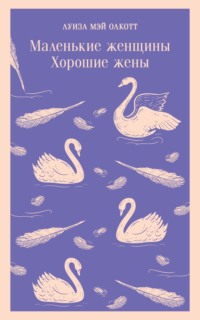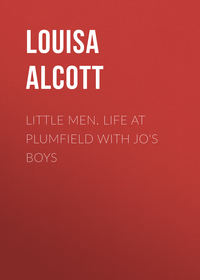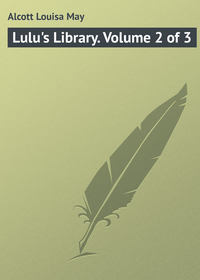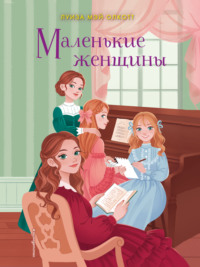 полная версия
полная версияRose in Bloom
"Yes, but not forget it. I never can; and he will never be again to me the Charlie I've been so proud and fond of all these years. O uncle, such a pity! such a pity!"
"Don't break your tender heart about it, child; for it is not incurable, thank God! I don't make light of it; but I am sure that under better influences Charlie will redeem himself, because his impulses are good, and this his only vice. I can hardly blame him for what he is, because his mother did the harm. I declare to you, Rose, I sometimes feel as if I must break out against that woman, and thunder in her ears that she is ruining the immortal soul for which she is responsible to heaven."
Dr. Alec seldom spoke in this way, and when he did it was rather awful; for his indignation was of the righteous sort, and much thunder often rouses up a drowsy soul when sunshine has no effect. Rose liked it, and sincerely wished Aunt Clara had been there to get the benefit of the outbreak; for she needed just such an awakening from the self-indulgent dream in which she lived.
"Do it, and save Charlie before it is too late!" she cried, kindling herself as she watched him; for he looked like a roused lion, as he walked about the room, with his hand clenched and a spark in his eye, evidently in desperate earnest, and ready to do almost any thing.
"Will you help?" he asked, stopping suddenly, with a look that made her stand up straight and strong as she answered with an eager voice, —
"I will."
"Then don't love him – yet."
That startled her; but she asked steadily, though her heart began to beat and her color to come, —
"Why not?"
"Firstly, because no woman should give her happiness into the keeping of a man without fixed principles; secondly, because the hope of being worthy of you will help him more than any prayers or preaching of mine. Thirdly, because it will need all our wit and patience to undo the work of nearly four and twenty years. You understand what I mean?"
"Yes, sir."
"Can you say 'No' when he asks you to say 'Yes,' and wait a little for your happiness?"
"I can."
"And will you?"
"I will."
"Then I'm satisfied, and a great weight taken off my heart. I can't help seeing what goes on, or trembling when I think of you setting sail with no better pilot than poor Charlie. Now you answer as I hoped you would, and I am proud of my girl!"
They had been standing with the width of the room between them, Dr. Alec looking very much like a commander issuing orders, Rose like a well-drilled private obediently receiving them; and both wore the air of soldiers getting ready for a battle, with the bracing of nerves and quickening of the blood brave souls feel as they put on their armor. At the last words he went to her, brushed back the hair, and kissed her on the forehead with a tender sort of gravity, and a look that made her feel as if he had endowed her with the Victoria cross for courage on the field.
No more was said then; for Aunt Plenty called them down, and the day's duties began. But that brief talk showed Rose what to do, and fitted her to do it; for it set her to thinking of the duty one owes one's self in loving as in all the other great passions or experiences which make or mar a life.
She had plenty of time for quiet meditation that day, because every one was resting after yesterday's festivity; and she sat in her little room planning out a new year, so full of good works, grand successes, and beautiful romances, that if it could have been realized the Millennium would have begun. It was a great comfort to her, however, and lightened the long hours haunted by a secret desire to know when Charlie would come, and a secret fear of the first meeting. She was sure he would be bowed down with humiliation and repentance, and a struggle took place in her mind between the pity she could not help feeling, and the disapprobation she ought to show. She decided to be gentle, but very frank; to reprove, but also to console, and try to improve the softened moment by inspiring the culprit with a wish for all the virtues which make a perfect man.
This fond delusion grew quite absorbing, and her mind was full of it as she sat watching the sun set from her western window, and admiring with dreamy eyes the fine effect of the distant hills clear and dark against a daffodil sky, when the bang of a door made her sit suddenly erect in her low chair, and say with a catch in her breath, —
"He is coming! I must remember what I promised uncle, and be very firm."
Usually Charlie announced his approach with music of some sort: now he neither whistled, hummed, nor sung, but came so quietly Rose was sure that he dreaded the meeting as much as she did, and, compassionating his natural confusion, did not look round as the steps drew near. She thought perhaps he would go down upon his knees, as he used to after a boyish offence, but hoped not; for too much humility distressed her: so she waited for the first demonstration anxiously.
It was rather a shock when it came, however; for a great nosegay dropped into her lap, and a voice, bold and gay as usual, said lightly, —
"Here she is, as pretty and pensive as you please. Is the world hollow, our doll stuffed with sawdust, and do we want to go into a nunnery to-day, cousin?"
Rose was so taken aback by this unexpected coolness that the flowers lay unnoticed, as she looked up with a face so full of surprise, reproach, and something like shame, that it was impossible to mistake its meaning. Charlie did not; and had the grace to redden deeply, and his eyes fell, as he said quickly, though in the same light tone, —
"I humbly apologize for – coming so late last night. Don't be hard upon me, cousin: you know America expects every man to do his duty on New-Year's day."
"I am tired of forgiving! You make and break promises as easily as you did years ago, and I shall never ask you for another," answered Rose, putting the bouquet away; for the apology did not satisfy her, and she would not be bribed to silence.
"But, my dear girl, you are so very exacting, so peculiar in your notions, and so angry about trifles, that a poor fellow can't please you, try as he will," began Charlie, ill at ease, but too proud to show half the penitence he felt, not so much for the fault as for her discovery of it.
"I am not angry: I am grieved and disappointed; for I expect every man to do his duty in another way, and keep his word to the uttermost, as I try to do. If that is exacting, I'm sorry, and won't trouble you with my old-fashioned notions any more."
"Bless my soul! what a rout about nothing! I own that I forgot: I know I acted like a fool, and I beg pardon; what more can I do?"
"Act like a man, and never let me be so terribly ashamed of you again as I was last night," and Rose gave a little shiver as she thought of it.
That involuntary act hurt Charlie more than her words, and it was his turn now to feel "terribly ashamed;" for the events of the previous evening were very hazy in his mind, and fear magnified them greatly. Turning sharply away, he went and stood by the fire, quite at a loss how to make his peace this time, because Rose was so unlike herself. Usually a word of excuse sufficed, and she seemed glad to pardon and forget; now, though very quiet, there was something almost stern about her that surprised and daunted him; for how could he know that all the while her pitiful heart was pleading for him, and the very effort to control it made her seem a little hard and cold? As he stood there, restlessly fingering the little ornaments upon the chimney-piece, his eye brightened suddenly; and, taking up the pretty bracelet lying there, he went slowly back to her, saying in a tone that was humble and serious enough now, —
"I will act like a man, and you shall never be ashamed again. Only be kind to me: let me put this on, and promise afresh; this time I swear I'll keep it. Won't you trust me, Rose?"
It was very hard to resist the pleading voice and eyes: for this humility was dangerous; and, but for Uncle Alec, Rose would have answered "Yes." The blue forget-me-nots reminded her of her own promise; and she kept it with difficulty now, to be glad always afterward. Putting back the offered trinket with a gentle touch, she said firmly, though she dared not look up into the anxious face bending toward her, —
"No, Charlie: I can't wear it yet. My hands must be free if I'm to help you as I ought. I will be kind; I will trust you: but don't swear any thing, only try to resist temptation, and we'll all stand by you."
Charlie did not like that, and lost the ground he had gained by saying impetuously, —
"I don't want any one but you to stand by me, and I must be sure you won't desert me, else, while I'm mortifying soul and body to please you, some stranger will come and steal your heart away from me. I couldn't bear that; so I give you fair warning, in such a case I'll break the bargain, and go straight to the devil."
The last sentence spoilt it all; for it was both masterful and defiant. Rose had the Campbell spirit in her, though it seldom showed; as yet she valued her liberty more than any love offered her, and she resented the authority he assumed too soon, – resented it all the more warmly, because of the effort she was making to reinstate her hero, who would insist on being a very faulty and ungrateful man. She rose straight out of her chair, saying with a look and tone which rather startled her hearer, and convinced him that she was no longer a tender-hearted child, but a woman with a will of her own, and a spirit as proud and fiery as any of her race, —
"My heart is my own, to dispose of as I please. Don't shut yourself out of it by presuming too much; for you have no claim on me but that of cousinship, and you never will have unless you earn it. Remember that, and neither threaten nor defy me any more."
For a minute it was doubtful whether Charlie would answer this flash with another, and a general explosion ensue; or wisely quench the flame with the mild answer which turneth away wrath. He chose the latter course, and made it very effective by throwing himself down before his offended goddess, as he had often done in jest; this time it was not acting, but serious earnest, and there was real passion in his voice, as he caught Rose's dress in both hands, saying eagerly, —
"No, no! don't shut your heart against me, or I shall turn desperate. I'm not half good enough for such a saint as you, but you can do what you will with me. I only need a motive to make a man of me, and where can I find a stronger one than in trying to keep your love?"
"It is not yours yet," began Rose, much moved, though all the while she felt as if she was on a stage, and had a part to play; for Charlie had made life so like a melodrama that it was hard for him to be quite simple even when most sincere.
"Let me earn it, then. Show me how, and I'll do any thing: for you are my good angel, Rose; and, if you cast me off, I feel as if I shouldn't care how soon there was an end of me," cried Charlie, getting tragic in his earnestness, and putting both arms round her, as if his only safety lay in clinging to this beloved fellow-creature.
Behind footlights it would have been irresistible; but somehow it did not touch the one spectator, though she had neither time nor skill to discover why. For all their ardor the words did not ring quite true: despite the grace of the attitude, she would have liked him better manfully erect upon his feet; and, though the gesture was full of tenderness, a subtle instinct made her shrink away, as she said with a composure that surprised herself, even more than it did him, —
"Please don't. No, I will promise nothing yet; for I must respect the man I love."
That brought Charlie to his feet, pale with something deeper than anger; for the recoil told him more plainly than the words how much he had fallen in her regard since yesterday. The memory of the happy moment when she gave the rose with that new softness in her eyes, the shy color, the sweet "for my sake," came back with sudden vividness, contrasting sharply with the now averted face, the hand out-stretched to put him back, the shrinking figure: and in that instant's silence poor Charlie realized what he had lost; for a girl's first thought of love is as delicate a thing as the rosy morning-glory, that a breath of air can shatter. Only a hint of evil, only an hour's debasement for him, a moment's glimpse for her of the coarser pleasures men know, and the innocent heart, just opening to bless and to be blessed, closed again like a sensitive plant, and shut him out perhaps for ever.
The consciousness of this turned him pale with fear: for his love was deeper than she knew; and he proved this when he said in a tone so full of mingled pain and patience that it touched her to the heart, —
"You shall respect me if I can make you; and when I've earned it may I hope for something more?"
She looked up then, saw in his face the noble shame, the humble sort of courage, that shows repentance to be genuine, and gives promise of success, and, with a hopeful smile that was a cordial to him, answered heartily, —
"You may."
"Bless you for that! I'll make no promises, I'll ask for none: only trust me, Rose; and, while you treat me like a cousin, remember that no matter how many lovers you may have, you'll never be to any of them as dear as you are to me."
A traitorous break in his voice warned Charlie to stop there: and, with no other good-by, he very wisely went away, leaving Rose to put the neglected flowers into water with remorseful care, and lay away the bracelet, saying to herself, —
"I'll never wear it till I feel as I did before; then he shall put it on, and I'll say 'Yes.'"
CHAPTER XI.
SMALL TEMPTATIONS
"O Rose, I've got something so exciting to tell you!" cried Kitty Van Tassel, skipping into the carriage next morning when her friend called for her to go shopping.
Kitty always did have some "perfectly thrilling" communication to make, and Rose had learned to take them quietly: but the next demonstration was a new one; for, regardless alike of curious observers outside and disordered hats within, Kitty caught Rose round the neck, exclaiming in a rapturous whisper, —
"My dearest creature, I'm engaged!"
"I'm so glad! Of course it is Steve?"
"Dear fellow, he did it last night in the nicest way, and mamma is so delighted. Now what shall I be married in?" and Kitty composed herself with a face full of the deepest anxiety.
"How can you talk of that so soon? Why, Kit, you unromantic girl, you ought to be thinking of your lover and not your clothes," said Rose, amused, yet rather scandalized at such want of sentiment.
"I am thinking of my lover; for he says he will not have a long engagement, so I must begin to think about the most important things at once, mustn't I?"
"Ah, he wants to be sure of you; for you are such a slippery creature he is afraid you'll treat him as you did poor Jackson and the rest," interrupted Rose, shaking her finger at her prospective cousin, who had tried this pastime twice before, and was rather proud than otherwise of her brief engagements.
"You needn't scold, for I know I'm right; and, when you've been in society as long as I have, you'll find that the only way to really know a man is to be engaged to him. While they want you, they are all devotion; but when they think they've got you, then you find out what wretches they are," answered Kitty, with an air of worldly wisdom which contrasted oddly with her youthful face and giddy manners.
"A sad prospect for poor Steve, unless I give him a hint to look well to his ways."
"O my dear child, I'm sure of him; for my experience has made me very sharp, and I'm convinced I can manage him without a bit of trouble. We've known each other for ages" (Steve was twenty and Kitty eighteen), "and always been the best of friends. Besides he is quite my ideal man: I never could bear big hands and feet, and his are simply adorable. Then he's the best dancer I know, and dresses in perfect taste. I really do believe I fell in love with his pocket-handkerchiefs first; they were so enchanting I couldn't resist," laughed Kitty, pulling a large one out of her pocket, and burying her little nose in the folds, which shed a delicious fragrance upon the air.
"Now that looks promising, and I begin to think you have got a little sentiment after all," said Rose, well pleased; for the merry brown eyes had softened suddenly, and a quick color came up in Kitty's cheek, as she answered, still half hiding her face in the beloved handkerchief, —
"Of course I have, lots of it; only I'm ashamed to show it to most people, because it's the style to take every thing in the most nonchalant way. My gracious, Rose, you'd have thought me a romantic goose last night while Steve proposed in the back parlor: for I actually cried; he was so dreadfully in earnest when I pretended that I didn't care for him, and so very dear and nice when I told the truth. I didn't know he had it in him; but he came out delightfully, and never cared a particle, though I dropped tears all over his lovely shirt-front. Wasn't that good of him? for you know he hates his things to be mussed."
"He's a true Campbell, and has got a good warm heart of his own under those fine fronts of his. Aunt Jane doesn't believe in sentiment, so he has been trained never to show any: but it is there, and you must encourage him to let it out; not foolishly, but in a way to make him more manly and serious."
"I will if I can; for, though I wouldn't own this to everybody, I like it in him very much, and feel as if Steve and I should get on beautifully. Here we are: now be sure not to breathe a word if we meet any one; I want it to be a profound secret for a week at least," added Kitty, whisking the handkerchief out of sight, as the carriage stopped before the fashionable store they were about to visit.
Rose promised with a smile; for Kitty's face betrayed her without words, so full was it of the happiness which few eyes fail to understand wherever they see it.
"Just a glance at the silks. You ask my opinion about white ones, and I'll look at the colors. Mamma says satin; but that is out now, and I've set my heart on the heaviest corded thing I can find," whispered Kitty, as they went rustling by the long counters strewn with all that could delight the feminine eye, and tempt the feminine pocket.
"Isn't that opal the loveliest thing you ever saw? I'm afraid I'm too dark to wear it, but it would just suit you. You'll need a variety you know," added Kitty in a significant aside, as Rose stood among the white silks, while her companion affected great interest in the delicate hues laid before her.
"But I have a variety now, and don't need a new dress of any sort."
"No matter, get it; else it will be gone: you've worn all yours several times already, and must have a new one whether you need it or not. Dear me! if I had as much pocket-money as you have, I'd come out in a fresh toilet at every party I went to," answered Kitty, casting an envious eye upon the rainbow piles before her.
The quick-witted shopman saw that a wedding was afoot; for when two pretty girls whisper, smile, and blush over their shopping, clerks scent bridal finery, and a transient gleam of interest brightens their imperturbable countenances, and lends a brief energy to languid voices weary with crying "Cash!" Gathering both silks with a practised turn of the hand, he held them up for inspection, detecting at a glance which was the bride-elect and which the friend; for Kitty fell back to study the effect of the silvery white folds with an absorbing interest impossible to mistake, while Rose sat looking at the opal as if she scarcely heard a bland voice saying, with the rustle of silk so dear to girlish ears, —
"A superb thing; just opened; all the rage in Paris; very rare shade; trying to most, as the lady says, but quite perfect for a blonde."
Rose was not listening to those words, but to others which Aunt Clara had lately uttered; laughed at then, but thought over more than once since.
"I'm tired of hearing people wonder why Miss Campbell does not dress more. Simplicity is all very well for school-girls and women who can't afford any thing better, but you can, and you really ought. Your things are pretty enough in their way, and I rather like you to have a style of your own; but it looks odd, and people will think you are mean if you don't make more show. Besides, you don't do justice to your beauty, which would be both peculiar and striking, if you'd devote your mind to getting up ravishing costumes."
Much more to the same effect did her aunt say, discussing the subject quite artistically, and unconsciously appealing to several of Rose's ruling passions. One was a love for the delicate fabrics, colors, and ornaments which refined tastes enjoy, and whose costliness keeps them from ever growing common; another, her strong desire to please the eyes of those she cared for, and gratify their wishes in the smallest matter if she could. And last, but not least, the natural desire of a young and pretty woman to enhance the beauty which she so soon discovers to be her most potent charm for the other sex, her passport to a high place among her maiden peers.
She had thought seriously of surprising and delighting every one, by appearing in a costume which should do justice to the loveliness which was so modest that it was apt to forget itself in admiring others, – what girls call a "ravishing" dress, such as she could imagine and easily procure by the magic of the Fortunatus' purse in her pocket. She had planned it all; the shimmer of pale silk through lace like woven frost-work, ornaments of some classic pattern, and all the dainty accessaries as perfect as time, taste, and money could make them.
She knew that Uncle Alec's healthful training had given her a figure that could venture on any fashion, and Nature blessed her with a complexion that defied all hues. So it was little wonder that she felt a strong desire to use these gifts, not for the pleasure of display, but to seem fair in the eyes that seldom looked at her without a tender sort of admiration, all the more winning when no words marred the involuntary homage women love.
These thoughts were busy in Rose's mind, as she sat looking at the lovely silk, and wondering what Charlie would say if she should some night burst upon him in a pale, rosy cloud, like the Aurora to whom he often likened her. She knew it would please him very much, and she longed to do all she honestly could to gratify the poor fellow; for her tender heart already felt some remorseful pangs, remembering how severe she had been the night before. She could not revoke her words, because she meant them every one; but she might be kind, and show that she did not wholly shut him out from her regard, by asking him to go with her to Kitty's ball, and gratify his artistic taste by a lovely costume. A very girlish but kindly plan; for that ball was to be the last of her frivolities, so she wanted it to be a pleasant one, and felt that "being friends" with Charlie would add much to her enjoyment. This idea made her fingers tighten on the gleaming fabric so temptingly upheld, and she was about to take it when, "If ye please, sir, would ye kindly tell me where I'd be finding the flannel place?" said a voice behind her; and, glancing up, she saw a meek little Irish-woman looking quite lost and out of place among the luxuries around her.
"Downstairs, turn to the left," was the clerk's hasty reply, with a vague wave of the hand which left the inquirer more in the dark than ever.
Rose saw the woman's perplexity, and said kindly, "I'll show you: this way."
"I'm ashamed to be throublin' ye, miss; but it's strange I am in it, and wouldn't be comin' here at all, at all, barrin' they tould me I'd get the bit I'm wantin' chaper in this big shop than the little ones more becomin' the like o' me," explained the little woman humbly.
Rose looked again, as she led the way through a well-dressed crowd of busy shoppers: and something in the anxious, tired face under the old woollen hood; the bare, purple hands, holding fast a meagre wallet and a faded scrap of the dotted flannel little children's frocks are so often made of, – touched the generous heart, that never could see want without an impulse to relieve it. She had meant only to point the way; but, following a new impulse, she went on, listening to the poor soul's motherly prattle about "me baby," and the "throuble" it was to "find clothes for the growin' childer, when me man is out av work, and the bit and sup inconvaynient these hard times," as they descended to that darksome lower world, where necessities take refuge when luxuries crowd them out from the gayer place above.









